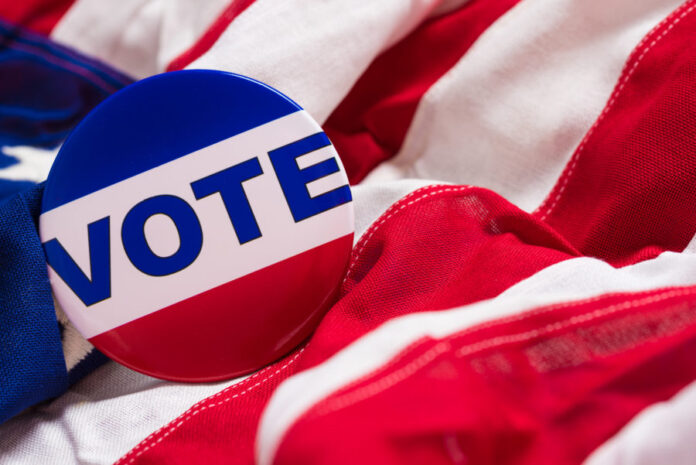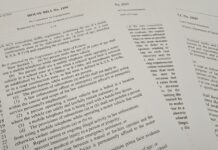(Will be updated as warranted)
A legislative attempt to fix an election law facing a legal challenge was derailed when it was vetoed by the governor because it was packaged with a bill that bars government agencies from accepting or spending so-called “Biden bucks” related to elections.
“There is no reason to potentially restrict the use of federal funds for election purposes,” Gov. Laura Kelly said in a statement when she vetoed the bill on Friday.
“Kansas is already one of the lowest-ranking states for use of utilizing federal funding,” Kelly said.
“Accepting these dollars helps Kansas ensure smooth administration of our elections.”
The bill bars any government agency from accepting or spending federal money for “election-related” activities unless approved by Congress or the Legislature.
The House voted 83-40 to pass the bill that would have expanded a 2021 state law that already bans election officials from accepting private grant money to administer elections.
The law made it a felony for election officials to accept or spend money, directly or indirectly, from any person.
There also was concern that the bill would have potentially made a government agency a criminal defendant.
The Senate voted 26-13 to approve the bill, which Democratic critics said was rooted in conspiracy theories about the president trying to use federal money to influence elections.
The legislation also tweaks language in a current election law that is now being challenged in court.
The bill lays out more specifically what makes it illegal for someone to falsely give the appearance of acting as an election official.
The current law requires groups to “knowingly” give the appearance of misrepresenting an election official to be at risk of prosecution.
The new bill says that falsely misrepresenting an election official means engaging in conduct with the intent to cause someone to believe they are acting as an election official.
Attorney General Kris Kobach’s office proposed the fix, noting that the courts have suggested the current law may criminalize innocent conduct when an individual is mistakenly perceived as an election official.
Dan Burrows, Kobach’s top deputy, said the change should allay concerns expressed by the court and ensure that only deceptive behavior is targeted.
Civic activists challenged the 2021 law in court, saying it would lead to the prosecution of Kansans registering and educating new voters.
The Kansas Supreme Court is now examining the case in which attorneys for the state argued it should be moot by the passage of the new law.
Meanwhile, the new bill also bars federal money – referred to as “Biden bucks” – from being used for activities such as registering new voters and voter assistance.
Kelly said that “restrictive voting legislation of any kind is wrong.
“Instead of making it more challenging for Kansans to participate in our democracy or focusing on problems that do not exist, I would urge the Legislature to focus on real issues impacting Kansans,” Kelly said.
The legislation, backed by Republican state Sen. Mike Thompson of Shawnee, ran into opposition from Democrats who questioned the purpose of the bill and what kind of election problems it was trying to solve.
At issue is an executive order issued by President Joe Biden that directed federal agencies to “consider ways to expand citizens’ opportunities to register to vote and to obtain information about, and participate in, the electoral process.”
Republicans have been suspicious of the executive order, alleging that it allowed the president’s appointees to use taxpayer funds to engage in what GOP attorneys general have described as “quasi-electioneering activities.”
“Your executive order appears to be a get-out-the-vote effort designed by the Left, to benefit the Left, all paid for by federal taxpayers,” the Republican attorneys general said in letter sent to the president two years ago.
“It is illegal, unethical, and unconstitutional, and that is why it must be rescinded.”
Thompson made a similar argument for his bill on the Senate floor.
“This is money that was never appropriated by Congress, never overseen by the state,” Thompson said during floor debate.
“It’s money that simply the Biden administration is trying to infuse into the election process in this state. It’s illegal money, in my opinion,” he said.
“We should not want the federal government doing things to impact elections or targets specific election activities through fiat spending that is not appropriated by Congress or not overseen by the state Legislature,” he said.
Democratic Sens. Ethan Corson of Fairway and Cindy Holscher of Overland Park voiced skepticism of the bill, highlighting the fact that it was backed by the Opportunity Solutions Project, a group based in Florida.
“It sounds like the kernel of this is based on a lot of conjecture and, frankly, conspiracy theories,” Corson said.
“I’m going to choose not to traffic in conspiracy theories, and I’m going to urge the body not to either.”
Holscher said there was no evidence to show that Biden’s executive order has had effect in Kansas.
“This bill is problematic,” she said. “This is a very concerning bill that is supported once again by the out-of-state organization Opportunity Solutions.
“This does not address a specific problem. It has an unclear scope of reach.”
The bill was backed by the Opportunity Solutions Project, the lobbying arm of the Foundation for Government Accountability, a 501(c)(3) based in Naples, Florida.
Stewart Whitson, a visiting fellow with the group, told lawmakers that the bill was needed to keep the current president’s administration – or others in the future – from funneling money to political allies to influence elections through targeted voter registration.
He took issue with the executive order issued by Biden.
Whitson suggested that the order was a “first-of-its-kind, get-out-the-vote effort in close – and secret – coordination with hand-selected third-party groups allied to the president’s political party.”
A group of Republican Pennsylvania lawmakers challenged the executive order in court, raising the independent state legislature theory, a disputed legal doctrine that holds that only state legislators can decide how federal elections are conducted.
A federal judge dismissed the case for a lack of jurisdiction.
















